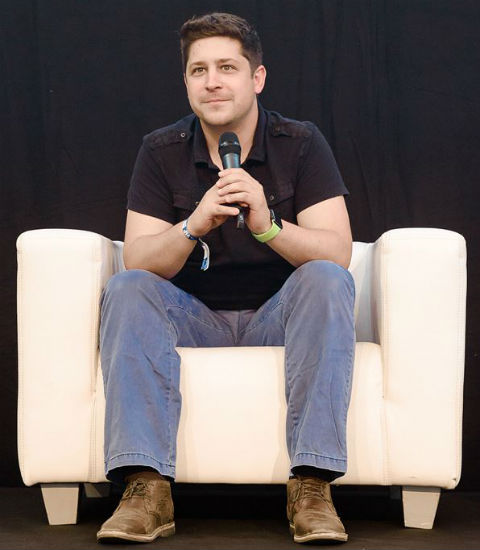Milwaukee-based filmmaker Aaron Biebert was never a smoker, and he certainly wasn’t much of a vaper. In fact, his earliest memory of vaping comes from making fun of a dopey ad back when the hobby was getting on its feet.
"I was watching TV years ago … and in this commercial, this guy looked like he was smoking in a restaurant, a waitress came by to tell him to put out his cigarette, and he took the thing and started jabbing it into his wrist, being like, ‘Look, it’s not on fire!’ He was kind of being a douchebag, and he looked like a total jerk," Biebert laughingly recalled. "This was the beginning of these e-cigarettes, and everyone was like, ‘Ugh.’ No one really knew what it was."
In just a few years, however, Biebert has gone from gently mocking e-cigarette users and vapers to fighting for their cause, landing right in the middle of the ongoing smoking/vaping debate with his upcoming documentary, "A Billion Lives."
The film – making its North American red carpet premiere right here in Milwaukee at The Pabst Theater on Saturday night at 8 p.m. – follows Biebert and his crew as he attempts to learn more about vaping as a viable alternative for smokers hoping to quit.
The quest sends the director across four continents and through countless interviews – ranging from a former executive director at the World Health Organization to a former director of the World Medical Association to a former Winston Man turned anti-smoking advocate and more – all pushing the argument that vaping is a healthier option for smokers looking for longer, healthier lives.
Over the course of his travels and interviews, he also finds evidence and arguments pointing toward many organizations – yes, tobacco companies, but governments and health agencies as well – trying to squelch vaping’s progress and popularity in the name of saving profits rather than the projected billion lives (thus the title) lost to smoking this century.
It’s certainly an intriguing conspiracy theory, presented compellingly in "A Billion Lives" with a mix of interviews with experts and vapers, as well as Biebert’s mostly on-screen narration. It’s also a case the Milwaukee director never particularly imagined himself taking on.
"I thought it was really stupid, so I would be teasing about (e-cigarettes) looking stupid and quit smoking or smoke the real thing – but you guys look ridiculous," Biebert recalled. "Then there was this big news last year where they said vapor technology might cause more cancer than smoking, and everyone was like, ‘See, not only do you look stupid, but you ARE stupid!’ And I was kind of one of those people."
The more he looked into the study, however, the more he discovered the study was, in his words, a fraud. According to Biebert and his doc, rather than atomizing the fluid as e-cigarettes and vapes do, the test set the temperature too high – at a level human beings wouldn’t and in many cases can’t ingest – and burned the liquid.
"That’s intellectually dishonest," the director argued. "That’s not how they’re used. That’d be like saying bread causes more cancer than cigarettes if you toast the thing to black every time. No human would eat burnt crust all day every day, but you could make a case that bread causes more cancer than cigarettes."
As Biebert dug a little deeper into vaping, he discovered the projected billion lives lost to smoking this century stat, that vaping was the number one most effective way to quit and that countries across the globe – including the U.S. – were banning or moving to ban them from use.
"When I found out a billion people were going to die and some of my friends who I’d been making fun of about this vaping thing explained to me some of the fraudulent stuff going on, I said OK," Biebert said. "We were looking for our next big project for a documentary, a billion people are going to die, maybe this is something nobody else is talking about.
"I wasn’t some big super zealot for helping save smokers’ lives until I learned about it; it was mostly just a business decision, to make a film that would be of interest to people, but the more I learned about this and people tell me their stories about how they were trapped for 50 years, tried to quit ten times … when 70 percent of people want to quit something that’s going to kill them, I think we need to help these people, not ban their number one and number two way of quitting."
 Director Aaron Biebert on tour with "A Billion Lives" (PHOTO: A Billion Lives Facebook)
Director Aaron Biebert on tour with "A Billion Lives" (PHOTO: A Billion Lives Facebook)
Biebert’s globe-trekking journey, to learn not only more about vaping and its history but also about the history of the tobacco and cigarette industries, took him nine months, grabbing interviews with esteemed former health, tobacco and vaping experts helping to clarify common misconceptions.
For instance, the interviews in "A Billion Lives" argue that, while nicotine gets a bad name for its presence in cigarettes, nicotine is not causing the cancer or the addiction. Biebert notes that even in the surgeon general’s report that said smoking causes lung cancer, nicotine was not identified as the issue.
"Everyone wants to demonize that, but you don’t see nicotine junkies breaking into Walgreen’s to steal nicotine gum," Biebert argued. "People smoke for the nicotine, but they die from the tar. So if we can get rid of the smoke, people don’t die."
"They’re calling (vapor technology) a tobacco product, but there’s no tobacco in it; it’s like a fog machine," he continued. "They’re saying they don’t know what it could do and all of this stuff, but it’s the same as inhalers for asthma. They know what’s in this."
After his travels, Biebert then took another three months to edit the film – and all of its often complicated, complex arguments about vaping safety and governmental and pharmaceutical ties to cigarettes – together. By the time "A Billion Lives" reached its final cut, however, the outcry about vaping regulations and banning had only grown.
"It’s a hot topic; it’s an important topic," he said. "We kind of hit this thing right at the right time, because a lot of people are unfortunately really freaking out right now."
Despite not even being released yet, the film’s already made a little impact on the war on vaping. While many countries have still banned or moved to ban the technology, in New Zealand, three days after "A Billion Lives" hosted its premiere there, the government announced it was going to reexamine its ban on vaping and defund some of the organizations speaking out against it.
And now the film will hit the big screen for the first time in North America right here in Milwaukee – Biebert’s hometown but also an unlikely locale for a red carpet premiere.
"It feels great," he said. "A lot of people were looking at me weird. We had offers to get it done in L.A. and New York, and I kind of pushed back. It’s gotta be at home.
"Ultimately, I don’t just want to do this movie. I was born in Milwaukee, but I didn’t grow up here, so when I moved back (ten years ago), I really saw there was a lot of potential for this city, and I’m watching it come alive right now. I really want to build Milwaukee up; I want to be a part of building it up. So I’ll make everyone come here."
From Milwaukee, Biebert says "A Billion Lives" should expand out into an official theatrical release later this year, possibly September he hypothesized. As of right now, though, he feels good about its odds – both of being seen by lots of millions of eyes and of making an impact on billions of lives.
"At the end of the day, this isn’t really a political issue; it’s just should people live or die, should they have the truth or not. And I think we can all agree they should have the truth, and they should be allowed to live if they want."
As much as it is a gigantic cliché to say that one has always had a passion for film, Matt Mueller has always had a passion for film. Whether it was bringing in the latest movie reviews for his first grade show-and-tell or writing film reviews for the St. Norbert College Times as a high school student, Matt is way too obsessed with movies for his own good.
When he's not writing about the latest blockbuster or talking much too glowingly about "Piranha 3D," Matt can probably be found watching literally any sport (minus cricket) or working at - get this - a local movie theater. Or watching a movie. Yeah, he's probably watching a movie.







